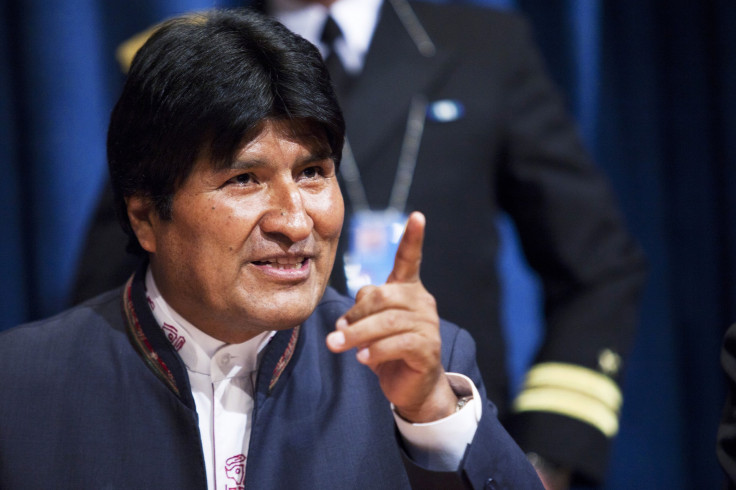Bolivian President Morales Shuns USAID: Why He May Not Need The Money

Bolivian President Evo Morales sparked controversy on Wednesday when he called for the U.S. Agency for International Development, or USAID, to leave his country.
The statement came during a May Day rally in La Paz, the Bolivian seat of government. Morales, who leads the Movimiento al Socialismo, or MAS, has long accused the U.S. government of conspiring against his leftist administration.
“They might think that they can manipulate us economically and politically here, but that is no longer the case,” he said to the crowds gathered outside of his presidential palace.
“The U.S. is still conspiring -- that is why we have decided to expel USAID of Bolivia.”
American State Department officials have denied Morales’ claims, calling them “baseless allegations.” But rumors of clandestine U.S. efforts to destabilize the Bolivian government have been circulating for years, lending some credence to the president’s suspicions.
A Falling Out
Bolivia and the United States have had a tense relationship since Morales was first elected in 2006. The American ambassador Philip Goldberg and other officials were expelled from the country in 2008, and Bolivia’s ambassador Gustavo Guzman was sent home from Washington in retaliation. Full diplomatic ties have since been restored, but the two ambassadors have yet to be re-exchanged.
At the heart of ongoing disputes is the coca plant, whose leaves are traditionally chewed by Bolivian indigenous groups; Morales himself once cultivated the crop as a farmer. But coca is a primary ingredient in cocaine, and U.S. officials have sought to curb production of the stimulant as part of Washington’s war on drugs.
Official assistance from the United States to Bolivia has been on the decline. In 2011, the last year on record with USAID data, aid disbursements to Bolivia totaled more than $96 million. That’s down from the $131.1 million disbursed in 2008, the year relations fell apart following the ambassador expulsions.
Though he has not made it official by notifying USAID itself, Morales seems prepared to renounce that assistance on the basis of Washington’s opposition toward his own administration.
“There’s been a number of declassified documents that came out, which point to a long history of efforts to undermine and limit the influence of the MAS political party,” said Jake Johnston, a research associate with the Center for Economic and Policy Research. “This dates back to well before Morales was elected.”
In 2008, for instance, ABC News published statements from an American Fulbright scholar in Bolivia who said that U.S. embassy officials had asked him to provide information on any Venezuelan or Cuban nationals he might come across in Bolivia. Peace Corps volunteers had reportedly received similar requests a year earlier. American officials deny those claims.
Wikileaks cables from 2009 show U.S. antipathy toward the constitution that was implemented under Morales in 2009, and toward the MAS party, which would go on to sweep general elections later that year.
Another cable from 2006, just after Morales was first elected, reveals then-Ambassador David Greenlee acknowledging that “many USAID-administered economic programs run counter to the direction the [government] wishes to move the country.”
USAID’s own data are too vague to shed much light on these implications. Official records name the sectors and agencies that implement American disbursements in Bolivia and other recipient countries, but they do not break the information down further to reveal the precise recipients of development monies.
“This gets to a larger issue with USAID: a lack of transparency on who’s getting the funding,” Johnston said.
Changing Dynamics
If Morales follows through on his threat to expel the aid organization, Bolivia stands to forfeit tens of thousands of dollars of American assistance funding on an annual basis.
That could have serious consequences for one of South America’s poorest countries, where about 26 percent of the population lives below the poverty line.
Then again, Bolivia’s economy has been doing well in recent years. It has enjoyed seven consecutive years of fiscal surplus, and the administration expects GDP to grow by 5.5 percent in 2013 to hit a record $28.7 billion.
This growth is fueled in large part by growing domestic demand for goods and a shrinking wealth gap. That’s not to say the administration’s fiscal policies are entirely sound; the country is still vulnerable due to high dependence on volatile mining and oil revenues, and extreme poverty still affects rural areas. But Bolivia’s ongoing growth is promising. A loss of USAID assistance would be detrimental, but not insurmountable.
In the end, Morales’ call to cut USAID could be little more than an empty threat -- an effort to get the organization in line with his own objectives. The president has called for its expulsion once before, in 2011. But given the suspicions surrounding USAID in Bolivia, combined with shrinking disbursements during a time of unprecedented economic growth in the South American country, Morales’ ideas about ending the assistance program aren’t as outlandish as they once were.
© Copyright IBTimes 2025. All rights reserved.





















